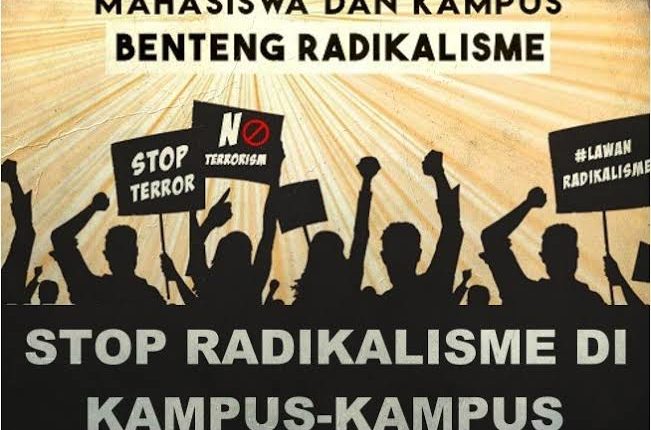Beware of Radicalism Exposes Young Generation
By: Raditya Rahman) *
All elements of society are susceptible to radicalism, and the younger generation is no exception. The spread of anti-Pancasila ideology is prone to cause conflicts with other communities, even triggering someone to commit violence to acts of terror. Society and Government must work together to address this phenomenon.
Young people or millennial generation are among the groups that are vulnerable to radicalism, including extremism and terrorism. This is because at the age between 17-24 years, they are still very energetic, and still have high spirits. In addition, they also relatively do not have family dependents. The historical record also says so. A name like Dani Dwi Permana was recorded, when she was 18 years old she had detonated a JW Marriot bomb. One effect is the cancellation of Manchester United’s visit to Indonesia.
Of course this should be a concern for all of us, because the younger generation who will become leaders in Indonesia, leaving young people exposed to radicalism, is of course the same as leaving a time bomb in Indonesia. At present the millennial generation is vulnerable to radical understanding because most of them are social media accesses. This is of course a catalyst for high-generation exposed to radicalism.
It is predicted that the spread of radicalism will increase through the virtual universe. This estimate can be examined from the increasing duration of millennial generation in social media with intelligence reports that the case of radicalism originated from social media. In other words, in Indonesia, the duration of social media is directly proportional to the level of radicalism in millennial generation. The Center for the Prevention of Radicalization (2018) states that in the process of radicalization, people adopt extreme belief systems including the desire to use, support and facilitate crime with the aim of promoting ideology, political projects or social change.
In another study, a Middle Eastern observer as well as Professor of International Relations at Padjajaran University, Dina Y. Sulaeman considered that the skepticism and indiscipline of the public in responding to content on social media could bear radicalism. According to him, many Indonesian citizens are scanned by social media and their emotions are easily ignited.
Worse after being exposed to hoaxes in Syria, they raised money to depart for jihad. But actually they are not jihad but only become victims. Whereas the real Jihad is not a jihad by taking up arms, but sincerity in worship and continuing to spread good for all humanity. The radicalism movement is based on the view of Pancasila and democracy is a man-made product, so it does not need to be obeyed. The only thing that must be obeyed is the laws created by God.
In Indonesia, one of the factors that makes radical understanding exist and develop, among others, through social media and through networking. The history book of the archipelago has recorded a dark history that occurred. Conflicts in various regions in the name of ethnicity and religion, such as the conflict between Islam and Christianity in Poso, can certainly be a lesson that anyone does not want to live in the midst of tension, the sound of bullets and bloody swords.
Radicalism is certainly not one of the characteristics of religious people, any religion certainly teaches love and peace, not war, hatred or killing of fellow human beings simply because according to him, those who disagree are heretics and infidels who must be slaughtered. If left unchecked, radicalism will become an epidemic in Indonesia and could have an impact on national security instability and the destruction of the sense of unity in Indonesia.
In handling this case, it certainly does not necessarily only become the role of the government in combating radicalism in Indonesia, but the role of the family sphere is also needed to provide good education for their children. Radicalism can certainly be prevented from the smallest scope, social media literacy also needs to be encouraged so that users of devices both old and young do not necessarily swallow information raw.
Indeed, the government has also tried to stem the flow of radicalism with the program of de-radicalization through social media, although it is recognized that there are still leaks so that not all radical-disseminating sites can be taken down by the government. To patch up the leak, social media literacy, primarily related to radicalism, certainly needs to be developed independently with the guidance of experts so as not to misunderstand. In addition, we all have a role so that millennial generation is increasingly busy with positive work to avoid exposure to radical content.
) * The author is a social political observer
